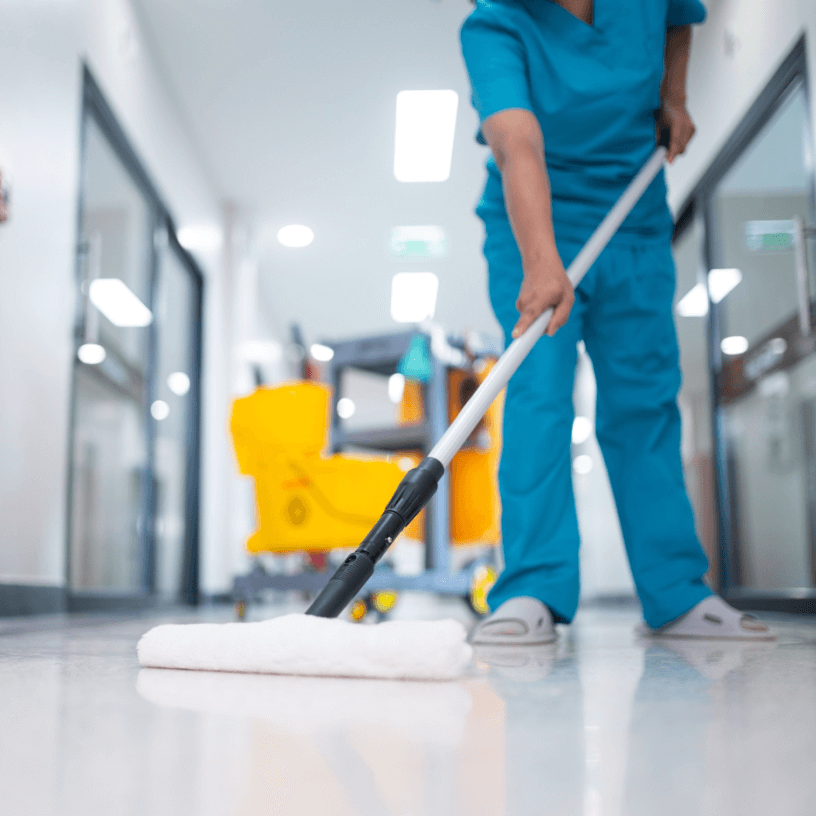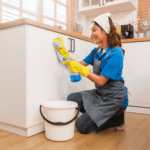Home / Compare Business Insuran… / Cleaners’ insurance
Cleaners’ insurance
What are the types of business insurance cleaners need to consider?






Key takeaways
- ‘Cleaners’ insurance’ is not a specific insurance type; it can refer to a range of business insurance policies that cleaners can take out to protect their business from financial risks.
- While public liability insurance is typically the most commonly purchased insurance, other types like workers’ compensation and personal accident and illness cover can provide additional security.
- Before choosing a policy, assess your business risks and compare options to decide on the insurance types and policy cover that’s right for your needs.
What is cleaners’ insurance?
 Cleaning businesses, whether run by sole traders, partnerships, small businesses or larger enterprises, may encounter distinct risks specific to the trade. While there isn’t a specific insurance product named ‘cleaner insurance,’ the term refers to a range of insurance packages designed to help cleaning businesses safeguard themselves against potential financial losses due to property damage, injuries, or legal claims.
Cleaning businesses, whether run by sole traders, partnerships, small businesses or larger enterprises, may encounter distinct risks specific to the trade. While there isn’t a specific insurance product named ‘cleaner insurance,’ the term refers to a range of insurance packages designed to help cleaning businesses safeguard themselves against potential financial losses due to property damage, injuries, or legal claims.
Cleaners may include domestic cleaners working in private homes, commercial cleaners servicing offices, schools and other business premises and even industrial cleaners handling factories, warehouses, and large-scale cleaning operations.
Always read the policy wording on the Product Disclosure Statement (PDS) and the Target Market Determination (TMD) to ensure that you know what’s covered in the insurance policy, and that the insurance cover is the right fit for you and your business.
Do I need insurance to be a cleaner?
While there’s no legal requirement for all cleaners to have insurance, many cleaning businesses and independent cleaners choose to have cover as peace of mind to protect themselves from financial risks. Some cleaning jobs, particularly in commercial settings or contracts with government agencies, may require cleaners to have insurance before working on-site.
Why would cleaners need insurance?
- Liability protection: Accidental damage to clients’ property or injuries sustained by third parties can lead to expensive legal claims.
- Work requirements: Clients, like real estate agencies, offices and construction sites, may require proof of insurance requirements such as a certificate of currency before hiring a cleaning business.
- Personal and business protection: Insurance may help cover the costs if you’re injured while working or your equipment is damaged.
- Legal compliance: Workers’ Compensation insurance is mandatory in Australia if you employ staff.
What business insurance do cleaners need?
Business owners, whether operating as sole traders or companies with employees, may consider various types of insurance to manage different risks.
As a general rule, cleaning businesses should consider different business insurance covers to ensure they are adequately covered.
Public liability insurance
Public liability cover can protect cleaners against claims of third-party injury or property damage resulting from their cleaning activities. Typically, this is one of the most essential types of insurance for cleaners, as accidents can happen anytime, even with precautions. Public liability insurance costs depend on the type of business and what the insurance covers, so it’s a good idea to get a few insurance quotes.
Examples of what public liability insurance can cover include:
- A cleaner in a public space forgot to put a wet floor warning sign while mopping, causing people to slip and fall.
- A vacuum cleaner cord causes a customer in a shopping centre to trip and fall, leading to medical costs and legal claims.
- Cleaning chemicals that stain or damage a client’s furniture or carpet.
Personal accident and illness insurance
Personal accident and illness insurance is typically important for sole traders and self-employed cleaners as this insurance can provide financial support if you can’t work due to an accident or illness.
Examples:
- A self-employed cleaner suffers a back injury from lifting heavy equipment and cannot work for several weeks.
- A cleaner contracts an illness that prevents them from working, leading to lost income.
Portable equipment insurance
Portable equipment insurance can cover the loss, theft or accidental damage of essential cleaning tools and machinery cleaners take with them for their job. Since cleaners rely on portable equipment like vacuum cleaners, pressure washers and steam cleaners, this coverage can ensure business continuity if these items are stolen from a vehicle or job site, damaged in transit, or lost due to fire or extreme weather.
For example:
- A cleaner’s high-powered carpet cleaning machine is stolen from their van while parked at a client’s property.
- A cleaner accidentally dropped and damages a portable generator while unloading it from their vehicle.
Commercial vehicle insurance
With this insurance cover, your insurance company may cover the cost of repairs or replacement if your work vehicle is involved in an accident, stolen or damaged. Depending on the terms outlined in your policy documents, this insurance may cover third-party property damage in an accident or provide comprehensive cover for the vehicle, including damage to both your own and others’ vehicles and theft or vandalism.
Some examples of cover can include:
- A cleaning van is rear-ended in traffic, causing damage that needs repairs.
- A cleaner’s van is stolen.
Workers’ compensation insurance
Workers’ compensation insurance is mandatory for employers in all Australian states and territories, with coverage varying by state. It provides financial support for employees who suffer work-related injuries or illnesses, covering medical expenses, lost wages and rehabilitation costs. If you employ staff at your cleaning business, you will need to have this insurance to cover them.
Examples of cover:
- A cleaner falls from a ladder while cleaning windows and breaks a leg, requiring months of rehabilitation.
- An employee suffers a respiratory condition due to prolonged exposure to harsh cleaning chemicals.
How to choose the right cleaners’ insurance
Assess your business needs
The type of insurance you choose will depend on the needs of your cleaning business. Consider the type of cleaning services you provide, your clients and the risks you face. For example, domestic cleaners may need only Public Liability insurance, while commercial or industrial cleaners may require multiple types of cover.
Compare policies
Look at policy inclusions, exclusions, limits, and premiums from different insurers to determine the product that’s right for your needs. You may also find that some business insurance providers offer tailored insurance packages to cleaners and cleaning companies with the cover you need.
Check your clients’ requirements
If you plan to work with corporate or government clients, you should verify whether they have specific insurance requirements before signing a contract.
Other types of business insurance
Every cleaner and cleaning business is different, so depending on the nature of your cleaning services, you may want to look into other types of business insurance as well, like:
Product liability insurance
Product liability insurance can protect businesses against claims of injury or damage caused by the products they supply, manufacture, or sell. For cleaners, this applies if they provide or use cleaning products that cause harm to clients, property or third parties.
Professional indemnity insurance
Professional indemnity insurance can protect against claims of negligence, incorrect advice or inadequate service leading to a client’s financial loss. While less common for general cleaners, it may be helpful for cleaning contractors providing specialised cleaning or consulting services.
Business interruption insurance
Business interruption insurance can help cover lost income and operating expenses if a cleaning business is unable to operate due to an insured event, such as fire, storm damage or theft. This insurance can help cover ongoing costs like rent, wages and loan repayments are while the business recovers.
Meet our business insurance expert, Adrian Taylor
As a General Insurance expert with over 13 years’ experience in financial services, Adrian Taylor strongly believes in the protection and peace of mind that all types of business insurance provide business owners. Adrian says this type of cover can be the difference between a business staying afloat and going under if trouble arises.